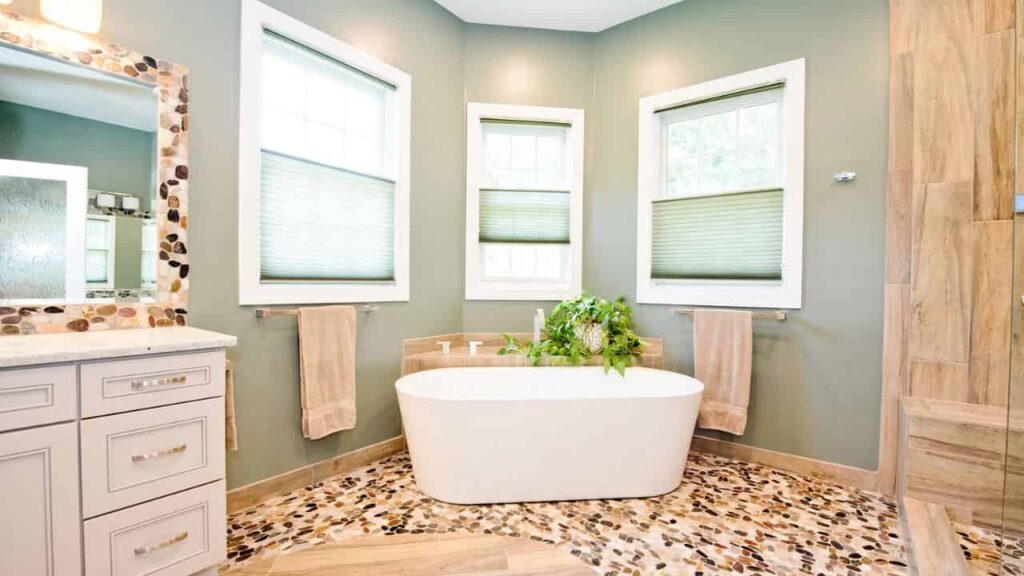Demand for pebble shower floor tiles has remained unchanged over the last decade. Unique, natural design, and DIY are the primary reason why someone would like to install it in bathroom.
Moreover, people love aesthetic looks of pebble shower tiles. They are quite easy to install and budget-friendly, due to which you may think of installing pebble tiles in your bathroom.
But, wait a minute!
Before you install them in your bathroom, make sure you know common pebble tile shower floor problems, their pros and cons, and if they are really safe to install.
For example, drainage problems, requirement of extra grouts to fill the gaps, uneven slippery surface, and regular maintenance are the few common problems with pebble shower floors.
This post highlights the key problems with pebble shower floors, their pros and cons, and if you should consider installing them in your bathroom.
By the end of this article, you’ll have enough idea to decide whether you should install pebble tiles in your bathroom or not.
10 Most common pebble tile shower floor problems
Pebble tile shower floor is a convenient and budget-friendly option for a unique and aesthetically appealing bathroom. They comes with number of aesthetic designs to give your bathroom a natural look.
You can choose the various pebble colors to install, they are non-slippery and comes in various shape and sizes. Additionally, the natural feeling that you get under your feet is unexplainable. With such style, you’ll always find an excuse to install them in your bathroom.
However, as mentioned in the beginning of this post, things are not that beautiful. It is necessary to to look at various problems associated with pebble shower floors before installing them.
Here’s the list of problems pebble tiles floor which are worth noting:
1. Drainage problem
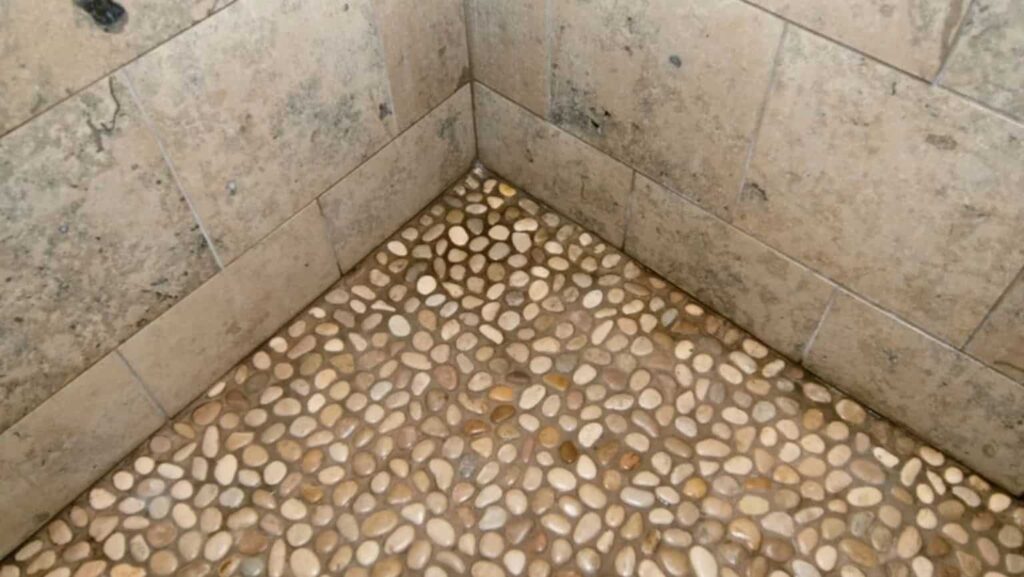
Unfortunately, this is one of most common problem with pebble floors.
Pebble tiles have uneven surface, creating larger than normal gaps and crevices between the pebbles. As a result, tiny particles like hair, soap, and debris can easily accumulate between the gaps. Due to this, water doesn’t drain properly.
Moreover, If you do not clear the clogs from the tiles, a slight fungal coating will start developing around the surface and leave thin white marks on the floor.
The problem may not be obvious on winter days, however, this could be a vital concern if you live in a hotter or more humid area.
The mold and fungus developed on the pebble tiles make the floor slippy which could lead to injuries and may become hard for elders to walk on. It may also affect the indoor air quality of your bathroom.
How to fix drainage issue:
It is recommended to install the pebble tiles properly in slots. Additionally, keep scrubbing the frequently to avoid drainage and mold issues.
Moreover, avoid buying highly raised pebble tiles and use enough grouts between tiles so that the gaps between them could be minimized.
Alternatively, you can go with sliced or flangled style pebble tiles so that water can not accumulate between gaps and crevices.
2. Need expert floor inspection

One of the unfortunate reality is the pebble and grout are not 100% waterproof. This keeps the grout wet all the time.
Due to constant body weight, it would create mini gaps between the two-adjacent tiles and the grouts. Due to this, water may accumulate on these gaps and damage the grout fillings.
As a result, the tile can wiggle and come off from the layout.
Hence, pebble tile floors always need professional inspection to make sure pebble tiles can easily fit and won’t make any gaps later. Professional flooring experts can reduce the necessary mistakes while installing it, however it can increase the unnecessary maintenance cost.
3. Not good for hard water
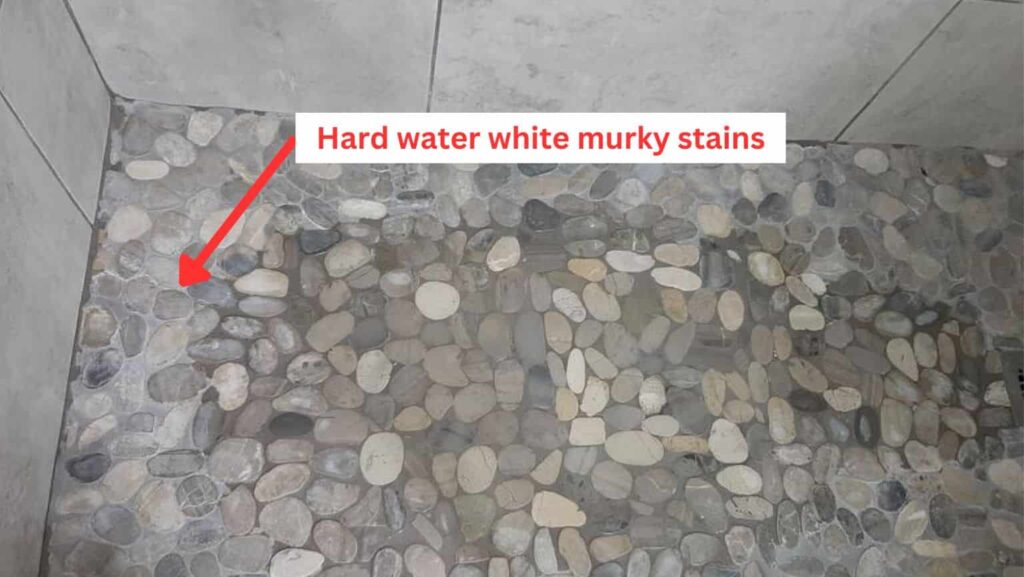
Have you noticed white, powdery build-up on your bathroom or kitchen faucet handles? If so, you’re probably living in a hard water area.
Indeed, pebble tiles surfaces are reactive to hard water. It’s because the hard water contains high amounts of minerals that leave white deposits on the tiles and cause a murky white color on the floor.
This white murky color would completely ruin the natural appeal of your bathroom.
In such cases, you need to extra care of your pebble tiles and your bathroom floors. For example, you need to regularly clean and brush up the tiles using some chemicals, like vinegar or rubbing alcohol.
Regular cleaning with vinegar is indeed a time-consuming process and maybe a headache for many homeowners.
4. Need high and regular maintenance

As per the previous discussion, we understood that the Pebble tile shower floor needs higher maintenance. However, the maintenance is not as easy as spraying the floor with a cleaner, wiping, and rinsing it.
Believe me, maintaining a pebble tile shower floor isn’t that easy.
You need to get into the depth and use additional chemicals to clean the pebble tiles in your bathroom.
This is because, the floor develops crevices and gaps that stick with hair, soap, and other unwanted debris. This clog may develop white murky deposits needing a robust cleaning solution like vinegar or rubbing alcohol.
Additionally, the pebble tiles need more grout that comes off over time. As a result, they tend to leave residue and discoloration problems.
All this explanation means that the pebble tiles need extra care and a higher level of maintenance on a regular basis.
5. Extra grout needed
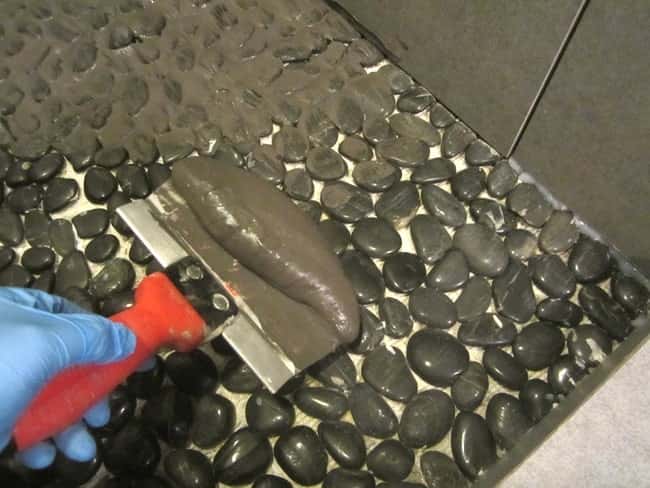
This is indeed another pebble tile shower floor problem that you need a high volume of grout than a normal tile. Pebble tiles floors need approximately 2.5X more grout than normal floor tiles.
Although, there is nothing wrong with using extra grout, however, it can create some bigger problem for a normal homeowner.
For example, extra grout means extra cost. Hence, the cost of installation will be higher on pebble tiles floor compared to normal tiled floors.
The second thing is selecting the right brand of grout becomes crucial. Moreover, these grouts tend to wiggle due to constant water and pressure.
As a result, improper application of grout can lead to various challenges like water leakage, gap, holes, and other issues.
6. Not best for feet

The biggest USP of pebble floor tiles is do-it-yourself(DIY) installation. Indeed it is true that anyone can adjust the pattern of these tiles with minimum knowledge.
Further, the feeling of putting feet on pebble tiles is unexplainable. It gives you a natural feeling of standing on the beach.
However, if you don’t have experience installing tile floors, the wrong placement of pebble tiles could make the floor unpleasant and painful to your feet.
Improper placement can lead to wiggling or uneven floors in the future. As a result, the comfort and aesthetic presence may disappear from your bathroom floor.
Additionally, some people are uncomfortable walking on pebble floors due to sensitive skin. That’s why an expert inspection and correct installation is crucial for the pebble tile shower floor.
7. Not durable
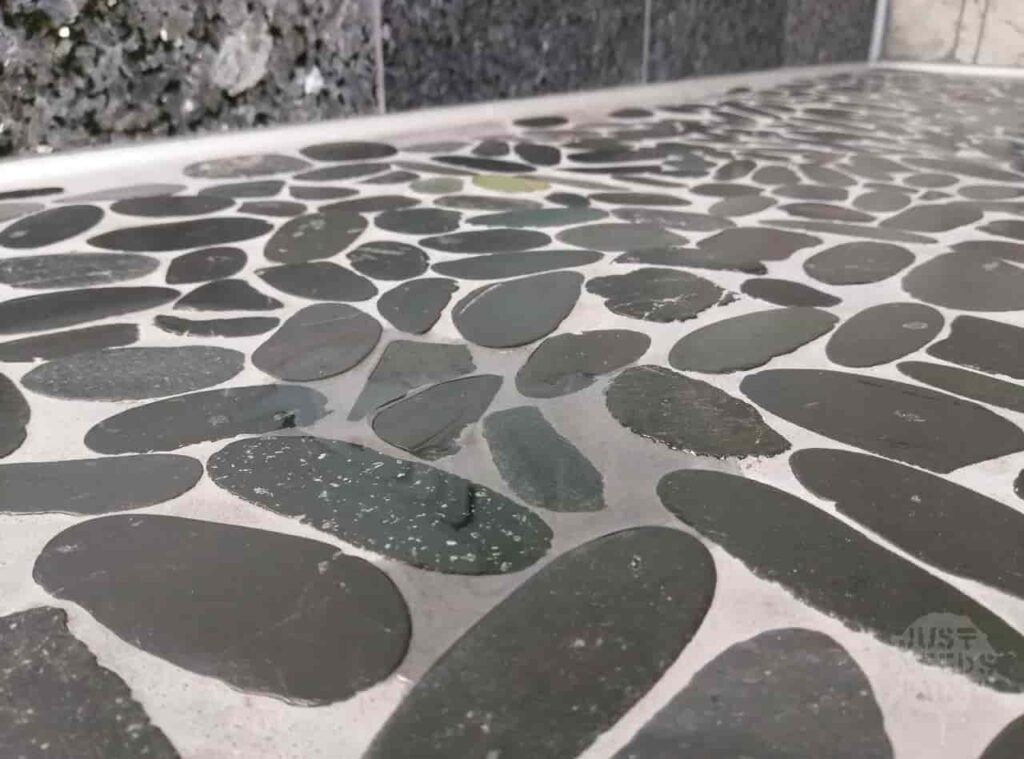
While regular tiles are durable and can be re-finished easily, pebble floors, on the other hand don’t last long. After a certain period of time, you’ll have to replace the pebbles with new ones.
It’s because the pebble floor has high exposure to grout and sealer. That’s why they tend to wear and tear much faster than others.
The cleaning materials, hair, dust, and other elements also tend to be stuck in exposed joints. As a result, discoloration, water leakage, and the uneven surface become regular, reducing longevity.
We recommended keeping grouts and sealers around the border of the pebbles, however, still, after a certain period of time it will eventually come off.
8. Can fade colors

Discoloration problems in the Pebble tile shower floor may depend on various factors. Still, many users experience faded color problems on their stone showers’ floors.
The condition mainly occurs due to water leakage underneath the grouts and tiles. Over time, the liquid stuck inside the gaps and became murky white.
On the other hand, cleaning chemicals and harsh scrubbing can also reduce the longevity of pebble tiles. So using a mild cleaning solution is vital to keep grout and sealing healthy.
9. Pebble tiles are hard to clean

As mentioned, cleaning the pebble tile shower floor differs from regular tiles. Pebble tiles are not as easy as just using a normal cleaner, wiping the floor, and letting it dry.
You need something additional to keep your pebble tiles neat and clean.
For example, while regular tiles can be cleaned just by scrubbing with normal water, however, pebble tiles are not that easy. You need to use some extra cleaning agents, like, vinegar or rubbing alcohol to clean the floors.
While you’ll be using extra chemicals over the floor to clean the tiles, at the same time, you also have to keep in mind that more aggressive cleaning agents can reduce the longevity of pebble floors.
10. Too slippery

Pebble tiles tend to become slippery for many reasons. Firstly it’s exposed grouts that became wet over time to water content and improper adjustment.
Secondly, the tiles tend to collect clogs in the gaps. As a result, white deposits start gathering on the floor and become slippery.
So, Is pebble tile good for the shower floor?
So, now, let’s get to the point, Is pebble tile suitable for the shower floor? Should you invest in installing pebble floors in your bathroom? Are pebble tiles shower floor problems so serious?
It actually depends.
Installing pebble tiles in the shower is entirely a personal preference. Pebble tiles have both, pros and cons.
However, there are a few things we are going to talk here that will help you conclude whether you should install pebble tiles in your bathroom or not.
This shower floor needs 2.5X grouts than regular tiles. So the extra pressure can lead to an uneven surface on your floor. Additionally, the tiles need higher maintenance due to exposed grouts and sealer.
There is always a risk of drainage problems and white deposits on the tiles. All these challenges can reduce the average lifespan of your shower floor.
So pebbles may not suit you if you need low-maintenance but highly durable shower tiles.
However, no one can deny the aesthetic presence of a Pebble tile shower floor. The Pebble is perfect for anyone looking for a budget-friendly, convenient, and naturally appealing bathroom.
Unique and textured pebbles are available in various shapes, designs, and colors. So users can pick and customize their bathroom interior accordingly.
Lastly, pebbles are different from rock floors; these stones are designed in a rounded shape and offer maximum comfort to feet.
Pebble tile shower floor pros and cons
So far, we talked various problems with pebble tile shower floor. And, by the time, I think, you may have concluded whether to install it or not.
Here is quick revisions, in the form of pros and cons:
Pros
- Pebble shower tiles add a natural and aesthetic outlook to your bathroom.
- The texture of the tiles may offer good slip resistance in the initial days.
- Pebble tiles are made from natural stones, making them a perfect eco-friendly choice for shower floor installation.
- Due to its natural characteristics, the tiles can be durable and withstand regular water content.
Cons
- Pebble tiles need more attention to cleaning and maintenance.
- Grout issue is common with this shower floor installation.
- Over time, the floor became uneven if not monitored.
FAQs on Pebble tile shower floor problems
Hard water minerals and moisture mainly cause the pebble shower floor turning white. You can prevent such conditions by regular cleaning with mild detergent.
Several techniques are available to restore a pebble shower floor. But the combination of baking soda and water is perfect for many occasions. Add 45 grams of baking soda and 1 liter of water in a bowl. Pour the mixture on the surface and leave for 5 hours. Later, rinse the paste using warm water and dry it with a microfiber cloth.
Experts suggest using high-performance cement grout for the pebble tile shower floor. The most popular are Prism, Permacolor, and Ultracolor. Ultimately you should avoid urethane-type grouts that may damage the surface.
White vinegar is the best cleaner for pebble stone shower floors. Spray some vinegar on the surface and leave for 10 minutes. Now scrub and rinse the floor to get your desired result.
Conclusion
Above is a detailed guide about common Pebble tile shower floor problems that you must know before installing into bathroom.
We hope you get a complete idea about the advantages and disadvantages of these tiles.
If concluded, pebble tile is famous for its affordability and natural presence on bathroom floors. These tiles offer many customizable options to install.
The floor requires higher maintenance and grout sealer than regular tiles. People who live near humidity and hard water areas find this flooring a headache.
Higher maintenance may increase the cost of cleaning after certain period of time. Moreover, they the pebbles tend to wiggle after long time and may completely come off the layout.
However, with proper care and expert inspection, pebble tiles or river rock floors can still be a successful flooring idea.

